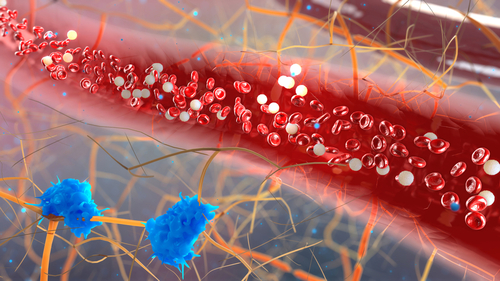Faulty Immune System Component in AAV Leads to Neutrophil Activation, Kidney Damage, Study Shows
Written by |

A faulty immune system component in patients with active ANCA-associated vasculitis (AAV) is not equipped to stop ANCA-induced neutrophil activation, leading to kidney damage, a Chinese study shows. The component is called complement factor H.
The study, titled “Complement Factor H Inhibits Anti-Neutrophil Cytoplasmic Autoantibody-Induced Neutrophil Activation by Interacting With Neutrophils,” was published in the journal Frontiers in Immunology.
The complement system, a part of the immune system, enhances the ability of antibodies and immune cells to clear away foreign pathogens.
Many studies have shown that activating the complement system through an alternative pathway rather than the standard pathway is an important part of the development of AAV.
ANCA (anti-neutrophil cytoplasmic autoantibody) induces activation of neutrophils — an immune cell that plays a major role in AAV — which then triggers the activation of the alternative complement pathway and generates the protein C5a.
C5a goes on to activate neutrophils, which leads to a self-perpetuating amplification loop for the neutrophil-activated complement pathway.
Complement factor H (FH) is a protein that functions as a key regulator of the alternative complement pathway activation.
Researchers hypothesized that FH takes part in the process of ANCA-mediated activation of neutrophils and, as a result, helps perpetuate the amplification loop.
But in a first analysis, researchers found that FH binds neutrophils and actually functions to reduce ANCA-induced activation of neutrophils. This indicates that the function of FH is to bind to neutrophils and reduce their activation.
Patients with AAV tend to experience significant injury to vital organs. The disease particularly targets the glomerular endothelial cells, which are vital kidney cells. The injury develops largely due to interactions between neutrophils and the endothelial cells, which line blood vessels.
Scientists previously suggested that FH functions as a molecule that aids in the adhesion and migration of neutrophils.
In this study, researchers demonstrated that while FH does enhance neutrophil adhesion and migration toward kidney endothelial cells, FH also blocks ANCA-induced activation of neutrophils when grown in a system of both kidney endothelial cells and neutrophils.
Interestingly, when researchers examined FH from patients with active AAV, the protein showed a reduced ability to bind neutrophils and inhibiting ANCA-induced neutrophil activation compared to FH from healthy patients.
These results indicate that in healthy patients, FH plays a role in blocking ANCA-induced neutrophil activation and so protects against kidney injury. However, FH from patients with active AAV is unable to bind neutrophils and as a result, cannot inhibit neutrophil activation by ANCA.
“These findings suggest a potential therapeutic role for FH in AAV, especially given that we recently found that the complement regulatory activity of FH is impaired in AAV patients,” the investigators wrote.





